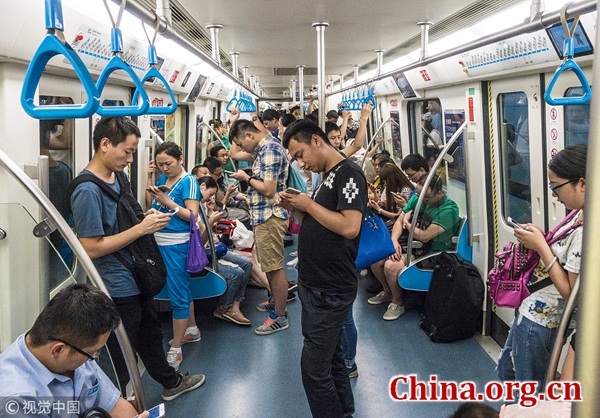More connected, yet more alone
- By Eugene Clark
 0 Comment(s)
0 Comment(s) Print
Print E-mail China.org.cn, January 6, 2019
E-mail China.org.cn, January 6, 2019

The UN's International Telecommunication Union recently reported that more than half of the people on the planet – approximately 4 billion – will have access to the internet by the end of 2018. While growing internet access and other advances carry potential to achieve great things, they also bring negative side effects. According to former U.S. Surgeon General Vivek Murthy, the biggest risk facing the U.S. is not smoking or even second-hand smoke, but isolation and loneliness. In the words of Japanese novelist Haruki Murakami, "Millions of people in this world, all of them yearning, looking to others to satisfy them, yet isolating themselves. Why?"
The connectivity conundrum
Despite the expansion of the internet – and in some cases because of it – more human beings than ever before are suffering from loneliness. While in one sense, technology makes the world a smaller and more connected place, it cannot replace genuine human-to-human contact, and in fact takes valuable time away from activities that build genuine community.
Of particular concern is the introduction of technological devices to children at increasingly younger ages. Emerging research shows that technology can result in harmful changes to the brain, leading to depression, withdrawal, anxiety, trouble sleeping and impulsivity. Clearly, more research is required into long-term effects on cognitive ability and social and emotional development. Many schools have been too quick to adopt technology in the classroom for younger grades, while wealthy IT developers in Silicon Valley often send their own children to schools that are free of such devices.
At work, too, employers are finding that technology is equally a distraction to adults, who spend many unproductive hours on social media and under an avalanche of emails and text messages. These activities continue at home, where they erode relationships and contribute to anxiety, loss of sleep and other problems.
At the same time, overwork is further contributing to loneliness. Professor Arlie Russell of UC Berkeley, in her book "The Outsourced Self," points to how the service sector has taken over many of the services once provided by family, friends and others in our inner circle. Childcare, naming of children, making of meals, sewing, simple repairs, shopping, ironing, looking after the elderly and many other services are increasingly sought from outside providers. Ironically, the more we depend on these services, the longer hours we must work to pay for them, and that snowballs to further demand for additional services.
IT solutions for IT problems
Technology itself may provide some of the answers to lessen the negative impacts it creates. For one, employers can deploy big data analytics and AI to track patterns of technology use and devise specific strategies to help free employees from more tedious tasks and prioritize what matters. They can also design work environments that create optimum relationships between humans and technologies. Developing a culture of greater awareness is also crucial. For example, some workplaces now have email-free days or put limits on after-work emailing. Others are working to reduce information overload, unnecessary meetings and other intrusions that distract employees from engaging in deeper, higher order work that is both more important and more fulfilling.
Beyond the workplace, we must also be more disciplined in relation to our personal information diet. If we absorb a steady stream of social media chatter and ignore more intellectually challenging media, it may be time to undergo digital detox – clear out our emails and unsubscribe from several of those mailing lists. We should also encourage people to acknowledge and share real feelings with close friends and family. We need to realize that the "perfect lives" we see on Facebook are far from reality, and that failures at work and in our personal lives are part of the human journey.
Above all, we need to safeguard our attention. Humans have only so much of it to give, and modern technology is hard-wired to demand and capture our attention, leaving less of it for other things. Just as employers redesign the work environment, individuals should redesign our home environments so that we form healthier habits and develop our full potential.
Eradicating the poverty of loneliness
As Mother Teresa wrote: "The most terrible poverty is loneliness, and the feeling of being unloved." Isolation can be exacerbated by inappropriate use of technology, and this may present major health and relationship challenges for all countries. It is incumbent upon governments, employers, community developers, designers, technology companies and individuals to pay greater attention to the way people best interact with their environments, so that we use technology to strengthen our human networks, enhance our social capital and improve the quality of life for all citizens. This requires a greater commitment to research and innovative solutions that take seriously the issues arising from social isolation and loneliness.
Eugene Clark is a columnist with China.org.cn. For more information please visit:
http://www.keyanhelp.cn/opinion/eugeneclark.htm
Opinion articles reflect the views of their authors only, not necessarily those of China.org.cn.





